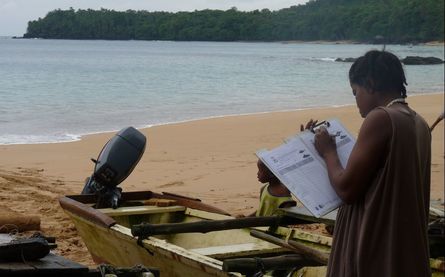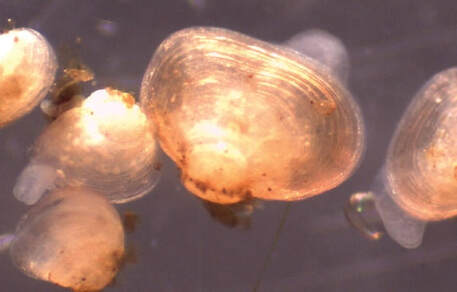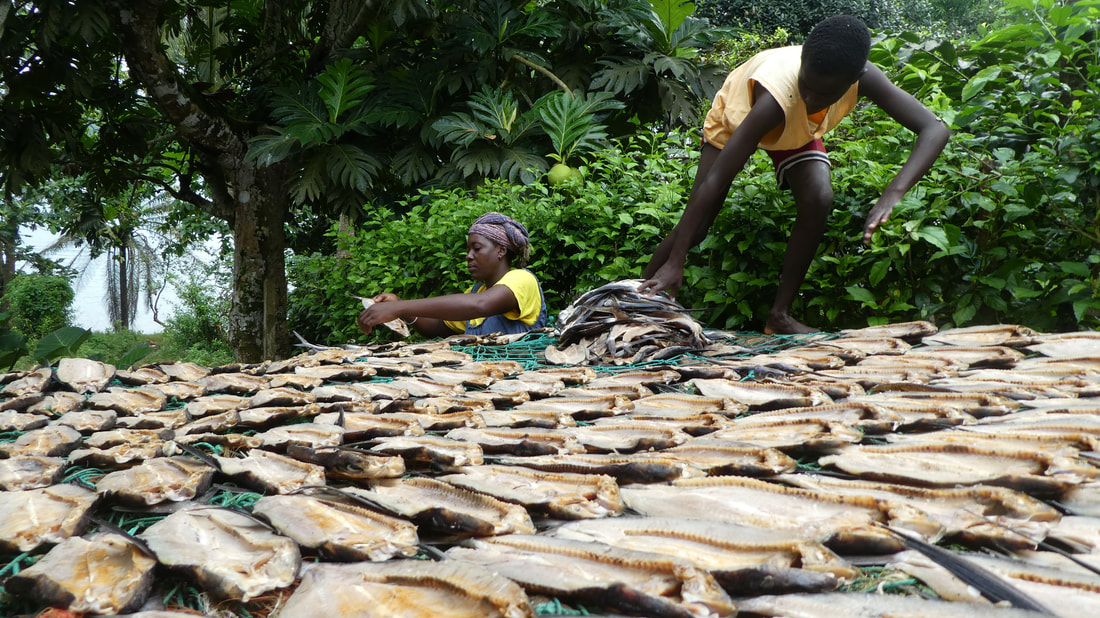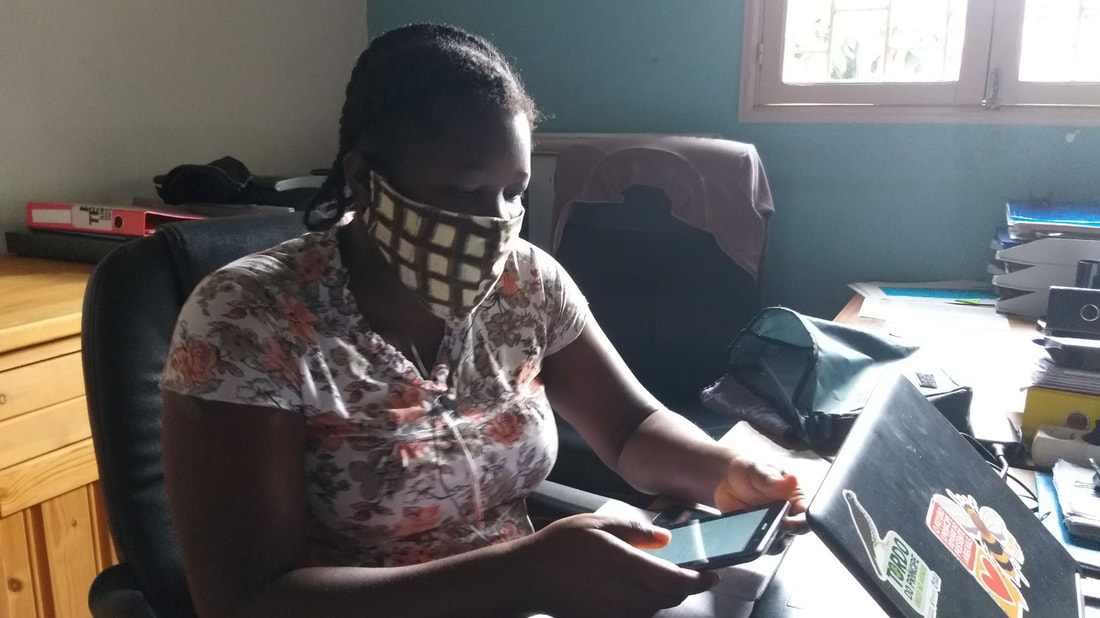|
Impacts of the COVID-19 pandemics on the livelihoods and food systems of Príncipe island (2020)
The COVID-19 pandemic is unprecedented in recent history. Global lockdown measures and international travel restrictions have strongly impacted markets, tourism, and livelihoods. Countries with less resilient economies and a high dependency on natural resources are expected to be more affected by the crisis. Understanding shifts in natural resource use caused by the crisis is essential to plan conservation efforts and prepare for future shocks. We used the island of Príncipe (São Tomé and Príncipe, a Small-Island Developing State) as a case study to assess the impacts of the COVID-19 on the livelihoods of rural communities. We undertook a telephone survey (n=132) using snowball sampling to assess the linkages between the pandemic and changes in income, natural resource use and market access. We found that 65% of the respondents reported reduced earnings, and that income-generating opportunities have dramatically narrowed. After major tourism investments in the last decade, the collapse of the industry has led to unemployment, loss of tourism-related income opportunities and significant reduction of demand for food products. The latter has especially impacted small-scale agriculture and animal husbandry, which has shifted back towards subsistence and the less profitable local market. Export of dried fish, an essential livelihood for many women in coastal communities, has been disrupted by loss of purchasing power and boat transport, leading to a saturation of the local market for fresh fish and a short-term reduction in fishing effort. Our results show that these impacts have already changed patterns of natural resource use and increased the risk of marginalisation in rural communities on Príncipe Island. If not addressed properly, these impacts can intensify unsustainable practices, compromising biodiversity and current conservation initiatives. |
An integrated assessment of São Tomé and Príncipe's artisanal fisheries through smartphone-based, participatory landing surveys (2017 - ongoing)
The project Omali Vida Nón / Umuen Vida No ("Sea Our Life" in the Creoule languages of Príncipe) aims to promote better management of marine resources in Principe island through the participation of those who are mainly affected: fishers and fish traders (palaiês). The project was created to test and implement ways of producing benefits for both fishing communities and marine resources, having strong research and community engagement components.
The project Omali Vida Nón / Umuen Vida No ("Sea Our Life" in the Creoule languages of Príncipe) aims to promote better management of marine resources in Principe island through the participation of those who are mainly affected: fishers and fish traders (palaiês). The project was created to test and implement ways of producing benefits for both fishing communities and marine resources, having strong research and community engagement components.
Distribution of fishing effort using participatory mapping of fishing grounds and landing data (2020)
Position: Research Assistant for the University of Exeter (2017-2019)
The project Omali Vida Nón / Umuen Vida No ("Sea Our Life" in the Creoule languages of Príncipe) aims to promote better management of marine resources in Principe island through the participation of those who are mainly affected: fishers and fish traders (palaiês). The project was created to test and implement ways of producing benefits for both fishing communities and marine resources, having strong research and community engagement components.
Position: Research Assistant for the University of Exeter (2017-2019)
The project Omali Vida Nón / Umuen Vida No ("Sea Our Life" in the Creoule languages of Príncipe) aims to promote better management of marine resources in Principe island through the participation of those who are mainly affected: fishers and fish traders (palaiês). The project was created to test and implement ways of producing benefits for both fishing communities and marine resources, having strong research and community engagement components.
 Participatory landing surveys: extension worker collecting data from fisheries landings in Praia Burras (Príncipe island) © GPPorriños
Participatory landing surveys: extension worker collecting data from fisheries landings in Praia Burras (Príncipe island) © GPPorriños
Exploring spatial patterns of fish distribution in São Tomé and Príncipe using Baited Remote Underwater Video (2017-2020)
Position: Research Assistant for the University of Exeter (2017-2019)
The project Omali Vida Nón / Umuen Vida No ("Sea Our Life" in the Creoule languages of Príncipe) aims to promote better management of marine resources in Principe island through the participation of those who are mainly affected: fishers and fish traders (palaiês). The project was created to test and implement ways of producing benefits for both fishing communities and marine resources, having strong research and community engagement components.
Position: Research Assistant for the University of Exeter (2017-2019)
The project Omali Vida Nón / Umuen Vida No ("Sea Our Life" in the Creoule languages of Príncipe) aims to promote better management of marine resources in Principe island through the participation of those who are mainly affected: fishers and fish traders (palaiês). The project was created to test and implement ways of producing benefits for both fishing communities and marine resources, having strong research and community engagement components.
 Participatory landing surveys: extension worker collecting data from fisheries landings in Praia Burras (Príncipe island) © GPPorriños
Participatory landing surveys: extension worker collecting data from fisheries landings in Praia Burras (Príncipe island) © GPPorriños
Exploring spatial patterns of fish distribution in São Tomé and Príncipe using Baited Remote Underwater Video (2017-2020)
Position: Research Assistant for the University of Exeter (2017-2019)
The project Omali Vida Nón / Umuen Vida No ("Sea Our Life" in the Creoule languages of Príncipe) aims to promote better management of marine resources in Principe island through the participation of those who are mainly affected: fishers and fish traders (palaiês). The project was created to test and implement ways of producing benefits for both fishing communities and marine resources, having strong research and community engagement components.
Position: Research Assistant for the University of Exeter (2017-2019)
The project Omali Vida Nón / Umuen Vida No ("Sea Our Life" in the Creoule languages of Príncipe) aims to promote better management of marine resources in Principe island through the participation of those who are mainly affected: fishers and fish traders (palaiês). The project was created to test and implement ways of producing benefits for both fishing communities and marine resources, having strong research and community engagement components.
 Sampling naiads in the Sabôr river, Northern Portugal (Fotografia: Paula Rosa)
Sampling naiads in the Sabôr river, Northern Portugal (Fotografia: Paula Rosa)
Minimisation actions in the Sabôr river (Portugal)
Position: Field technician, intern for Biota with funding from the Santander-CRUE-CEPYME scholarships scheme for internships abroad.
The project involved several minimisation actions for the construction of a dam in the Sabôr river, including relocation of naiad (freshwater bivalves) populations from the areas affected by the dam to unaffected areas upstream.
Position: Field technician, intern for Biota with funding from the Santander-CRUE-CEPYME scholarships scheme for internships abroad.
The project involved several minimisation actions for the construction of a dam in the Sabôr river, including relocation of naiad (freshwater bivalves) populations from the areas affected by the dam to unaffected areas upstream.
 Ex-situ reproduction of Naiads in Campelo (Picture: Joaquim Reis)
Ex-situ reproduction of Naiads in Campelo (Picture: Joaquim Reis)
ECOTONE – Management of riparian habitats towards the conservation of endangered invertebrates (funded by LIFE - EU)
Position: Laboratory technician, intern for Quercus, associação nacional de conservação da natureza, with funding from the Santander-CRUE-CEPYME scholarships scheme for internships abroad.
The objective of the ECOTONE project was the conservation of alder alluvial forests in two Portuguese rivers. This included improving the conservation status of two species of freshwater pearl mussels (Margaritifera margaritifera and Unio crassus), by testing several ex-situ reproduction techniques to increase the mussel populations.
Position: Laboratory technician, intern for Quercus, associação nacional de conservação da natureza, with funding from the Santander-CRUE-CEPYME scholarships scheme for internships abroad.
The objective of the ECOTONE project was the conservation of alder alluvial forests in two Portuguese rivers. This included improving the conservation status of two species of freshwater pearl mussels (Margaritifera margaritifera and Unio crassus), by testing several ex-situ reproduction techniques to increase the mussel populations.

